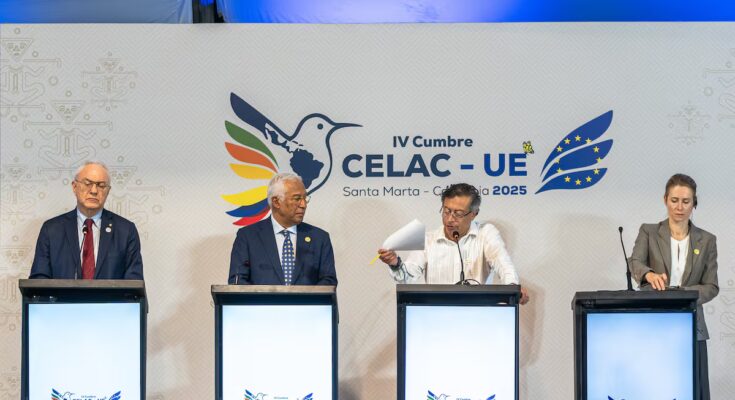If in the days leading up to the CELAC-EU summit, held this Sunday in Santa Marta, Colombia, it had been considered lackluster due to announcements of conspicuous absences, its final declaration, signed by representatives of 58 of the 60 states of the two blocs – something like one in four countries in the world – reminds us that the transatlantic relationship encompasses all kinds of issues, from climate change to digital life. In the wide repertoire of agreements specified in the 52 points of the document and which neither Venezuela nor Nicaragua have signed, the following messages stand out:
1. Defense of multilateralism
“We are driven by the desire to deepen the historical ties that unite us, at a time when multilateralism is being questioned around the world,” says point 4, the first to come into play. “We renew the strategic importance of a bi-regional relationship based on (…) multilateralism and international cooperation”, point 5 below.
2. Criticize Trump without naming him
The president of the United States is the main protagonist of the final document of a summit to which he was not invited, as the rejection of many of his actions or policies appears in various places, without his name. “We reiterate our commitment to a rules-based multilateral trading system, grounded in international law, that is open, transparent, inclusive, non-discriminatory and predictable,” reads paragraph 26, in defense of the opposite of Republican tariff policy. “We underline the importance of moving forward together to reduce trade tensions,” reiterates point 28. “We recognize the need to preserve the neutrality of the Panama Canal,” underlines point 11, in reference to the first country in which Trump directly threatened to intervene. “We agree on the importance of strengthening our cooperation in migration management, including return processes, and recall our commitment to deepening cooperation and dialogue on migration and mobility in a comprehensive way,” says point 47, in another example of these darts.
3. Concern about attacks on suspected drug traffickers
“We reiterate our opposition to the threat or use of force and to any action that does not comply with international law and the Charter of the United Nations,” is a general reference to point 8. Two paragraphs later the reference to the twenty missile attacks becomes clear. “We address the importance of maritime security and regional stability in the Caribbean. We agree on the importance of international cooperation, mutual respect and full respect for international law, including in the fight against transnational organized crime and illicit drug trafficking. Several CELAC member states highlighted their national positions regarding the situation in the Caribbean and the Pacific.”
4. Questions to Venezuela
“We reiterate our firm commitment to democracy, including free, inclusive, transparent and credible elections,” says point 6, in an unveiled reference to the July 2024 elections, in which Nicolás Maduro declared himself the winner without showing any evidence of that result. In fact, the Bolivarian Republic has “dissociated itself” from the entire declaration.
5. Reform of the UN and the financial system
“We underline the need to strengthen the multilateral system, with the United Nations at its centre, and to promote more effective, inclusive, transparent and democratic global governance”, point 19 in general terms, which is then developed in more detail. “We support a comprehensive reform of the United Nations Security Council to make it more representative, inclusive and democratic, better reflecting current realities by strengthening the voice of underrepresented regions,” it begins in point 20. Next, in point 25, they agree to “promote more just, inclusive and effective international financial institutions.”
6. Bet on peace in Gaza and Ukraine
“We reiterate our deep concern about the ongoing war against Ukraine, which continues to cause immense human suffering,” states point 14. Point 15 concerns the other major conflict: “We recognize the agreement reached on the first phase of the Comprehensive Plan to End the Conflict in Gaza, as well as the results of the Sharm el-Sheikh Peace Summit (…) We reiterate our firm commitment to comprehensive, just and lasting peace, in accordance with relevant United Nations Security Council resolutions United, on the basis of the two-state solution.”
7. Warning for misinformation
“We recognize the need to address and counter disinformation and misinformation, as well as hate speech, including that which perpetuates gender-based violence and discrimination, particularly in digital environments,” reads paragraph 44.
8. Agreement to fight climate change
“We recognize the impacts of climate change on all countries, in particular vulnerable developing countries, in particular least developed countries, small island developing States, landlocked developing countries and other categories of vulnerable developing countries in Latin America and the Caribbean, and recognize the need for urgent action to increase adaptation,” underlines point 30. The following maintains focus on the global problem: “We recognize the need for significant, rapid and sustainable greenhouse gas emissions, in line with the 1.5°C trajectory.
9. Support for an alternative vision on drugs
“We recognize that the global drug problem requires a joint response based on the principle of common and shared responsibility, through a balanced, comprehensive, integrated and evidence-based approach,” underlines point 38.


